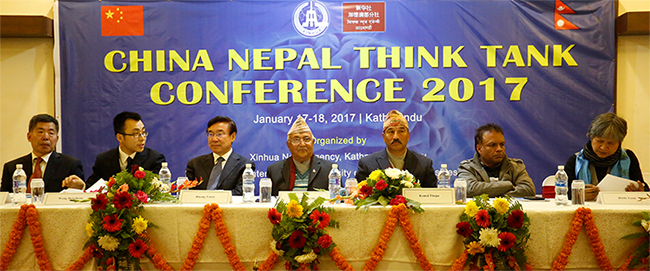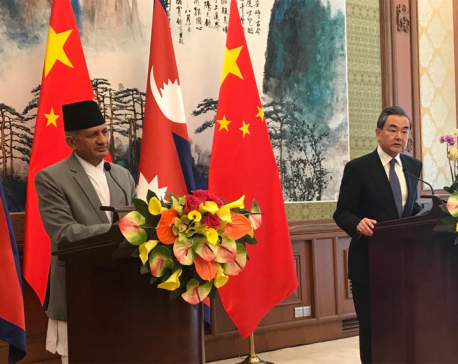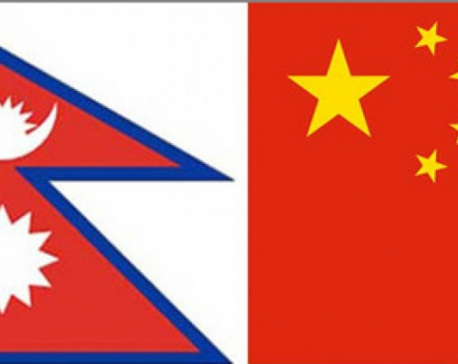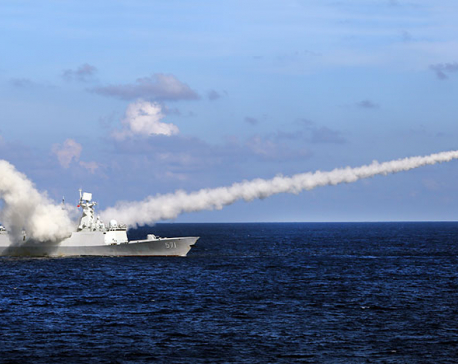
OR
You should have been in ‘China Nepal Think Tank Conference’ jointly organized in Kathmandu last month by Xinhua News Agency, Kathmandu Bureau and Nepal Study Center at Hebei University of Economics and Business, China. You would then know some of China’s views on India, the West (the European Union and America) and, most important, on Nepal.
The conclusion of 14 Chinese scholars representing various universities and think tank institutes of China was: Do not undermine China. China will increase its engagement in Nepal no matter how hard India and the West resist.
While Nepali politicians reiterated their commitment to ‘One-China’ policy and described the northern neighbor as ‘all-weather friend’, the Chinese expressed their concern about reaction of India and the West over Nepal-China proximity.

ML chairman K P Oli, RPP chairman Kamal Thapa and other Nepali politicians with Chinese scholars at the inaugural session of China-Nepal think tank conference.(Republica)
Political leaders (from Nepali Congress, CPN-UML, RPP and Naya Shakti) praised China for treating Nepal as a sovereign country. “China has always respected Nepal’s sovereignty, dignity and self respect. There have never been any ups and downs in Nepal’s relation with China. There have only been ups and ups,” UML chief KP Oli, who was the chief guest at the conference, said in his inaugural address.
Chairman of Rastriya Prajatantra Party Kamal Thapa lauded Nepal and China’s “as old as history” relations “marked with mutual trust and friendship and which are trouble-free most of the times.” China for Nepal “is a friend in need,” he said.
These accolades from Oli and Thapa, who during their term in Singha Durbar in 2015/16 had reached out to China despite opposition from various quarters and made the trade and transit deal possible, were natural.
But it was a bit surprising to hear the representative of Federal Socialist Forum Nepal, the party which had displayed express unhappiness with China for providing fuel grants to Nepal in 2015, sing China’s laurels. Its leader Shivaji Yadav praised China for respecting “Nepal’s sovereignty” during Madhesh protest. “We are thankful to China for not interfering in Nepal’s affairs,” he said. The protests led by Madheshi alliance had witnessed burning of Chinese flags in Tarai towns in open display of aversion to China.
So what do you make out of these statements?
The message is: No leader in Nepal can speak ill of China just to please the West and India, though they might speak ill of the West and India to remain in good books of China. At least not in public forums.
Chinese intellectuals largely spoke on Nepal-China-India economic and cultural exchanges and the need for three countries to together work on China’s ambitious ‘One Belt One Road’ project. One Chinese scholar ascribed India’s reluctance to work on trilateral cooperation and OBOR to its colonial mindset. Another Chinese scholar Huang Youyi told me: “What does the West and India think of China? We are not like we were thirty years ago. We have become rich, militarily strong and we are a rising world superpower.” In an interview with Republica he warned India not to get too cozy with the US. “The US can suddenly turn against India when it needs China. The US is an unpredictable power”.
In a similar vein, Yubaraj Sangroula, who was a member of a discussion panel, warned the West not to create instability in Nepal. “The Western countries including the US are in Nepal to create instability here and to encircle China. China and Nepal should fight them together.”
Understandably the conference must have raised several eyebrows. A member of the organizer committee confided to me that there were many uninvited guests. These unfamiliar faces, he suspected, might have come on the behalf of India and the West to hear what participants of the conference had to say.
There is a world of difference between the China the Chinese want us to see and the China the West would have us believe in. For the West, China is a country sustained by an authoritarian, communist dictatorship with no regard for human rights and civil liberty. The economic rise of China, in their reading, was only possible at great cost of human rights and freedom. The West highlights the darker sides of China.
In Mao’s Great Famine, Dutch historian Frank Dikotter portrays the picture of Chinese suffering between 1958 and 1962, the years when Mao led the country on the path of industrialization and mass production and whose ‘great leap forward’ made the country what it is today.
“Farmers enrolled on irrigation projects were routinely cursed and beaten,” Dikotter writes, “villagers were tied up for stealing a few vegetables; others who failed to work hard enough were stabbed with knives by cadres trying to impose a ruthless work regime.” Dikotter suggests that the great famine that hit China and which led to death of around 50 million people was a man-made disaster. People were forced into cannibalism for survival. “In this world plundered of every layer that might offer sustenance, down to the bark and mud, corpses often ended up in shadow graves or simply lay by the roadside. A few people ate human flesh,” he writes. “As famine tightened its grip some people eventually dug up, boiled and ate human bodies.” Human flesh was traded on black market.
The Chinese admit to suffering but also quickly remind that this was 60 years ago. They take pride in the fact that they have emerged as a global power despite all those odds.
The world has changed since 1960. So has China. Today big share of what the world wears, watches and consumes comes from China.
As for Nepal-China relation, it has not been as trouble-free as is sometimes claimed. Historically Nepal and China have been at odds on many occasions. Nepal has fought three wars (in 1788, 1792 and 1855) with Tibet, today’s Tibet Autonomous Region of China. Nepali troops had captured territories of Kuti, Sigatse, Kerung and Nyalam of Tibet. In the war of 1855, Nepali troops had looted precious pearls, jewels and, gold, silver and corals from various monasteries in Tibet.
Despite the history of loss, suffering and retribution, after they entered diplomatic relation in 1955, Nepal and China have buried the hatchet. China has a made it a point to commit to Nepal’s sovereignty, territorial integrity, more so when Nepal has had to face Indian highhandedness. Perhaps because of this, or because there is little interaction between the two peoples, Nepalis think of China positively.
But it is not easy for Nepal to maintain balanced ties with China. What is ‘balanced’ for Nepal becomes Nepal’s pivot to China for India. Every time Nepal has reached out to China or tried to do so, India has punished Nepal in one or the other way.
Facts speak for themselves. When King Mahendra removed India’s military mission from the northern border points in a bid to improve ties with China and opened Nepal’s passage to China (the Araniko Highway) during the late 1960s, India imposed a blockade in 1969. When Nepal imported weapons from China in 1989, India responded with another blockade. When King Gyanendra sought to include China in SAARC in 2005, his regime collapsed. And when Nepal refused to be dictated by India on constitutional matters and finally brought the constitution, we faced the wrenching blockade in 2015-16. When KP Oli turned to China his government was overthrown.
The current prime minister looks guilt-ridden that by tilting towards India he has lost the goodwill he had earned with China.
Nepali prime ministers have been struggling to maintain ‘balanced’ relation with China and India. They may have to struggle for years to come. But China seems unstoppable. It has been expanding its reach across the world. How the West and India will counter China in Nepal remains to be seen.
What will be suicidal for Nepal is the belief that as China and India rise as global economic powers, the spillover from their growth will change the face of Nepal. This is a defeatist view. It is like waiting for your big neighbors to get rich so that they can give you something out of generosity for your survival while you stay idle. We need to get rid of this dependence syndrome.
The only way China and India will start taking Nepal seriously is if Nepal is able to say: You are prospering, good luck with that. But we will also rise.
mahabirpaudyal@gmail.com
You May Like This

In China, foreign minister Gyawali dreams to travel in China by modern train
BEIJING, April 18: Nepal is a natural area for cooperation between China and India, the Chinese government’s top diplomat State... Read More...

China questions Nepal’s commitment to ‘One China’ policy
KATHMANDU, Nov 8: Expressing concern over the commitment of the new government to Nepal’s long-held one-China policy, China has registered strong... Read More...

China announces South China Sea military exercises
BEIJING, July 18: China said Monday that it is closing off a part of the South China Sea for military exercises... Read More...




Just In
- Navigating the Digital Diplomacy Divide: Balancing Tradition and Technology in Global Relations
- Youth attempts suicide amid police torture over Facebook comments against home minister
- Time to declare EVMs’ end
- World Malaria Day: Foreign returnees more susceptible to the vector-borne disease
- MoEST seeks EC’s help in identifying teachers linked to political parties
- 70 community and national forests affected by fire in Parbat till Wednesday
- NEPSE loses 3.24 points, while daily turnover inclines to Rs 2.36 billion
- Pak Embassy awards scholarships to 180 Nepali students















Leave A Comment